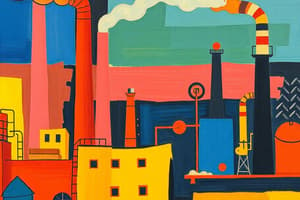Podcast
Questions and Answers
Industrialisation
Industrialisation
Flashcards are hidden until you start studying
Study Notes
Industrial Revolution
- A period of major technological, economic, and social change that began in Great Britain in the late 18th century and spread to other parts of the world
- Characterized by the introduction of new machines, power sources, and manufacturing processes
- Led to the growth of factories, the rise of the working class, and the development of new cities
- Marked a shift from an agrarian society to an industrial one
- Key inventions included the steam engine, the power loom, and the cotton gin
- Resulted in increased production, lower prices, and greater availability of goods
- Created significant social changes, including the migration of people from rural areas to urban centers and the emergence of new social classes
- Had both positive and negative consequences, including environmental damage, child labor, and poor working conditions
Impact of Industrialization
- Economic growth: Industrialization led to significant economic growth, as new industries and businesses were created, and productivity increased.
- Urbanization: Industrialized nations experienced rapid urbanization, with people moving from rural areas to cities to find work in factories.
- Social change: Industrialization resulted in the rise of new social classes, including the working class and the middle class. It also led to changes in family structures and gender roles.
- Environmental impact: Industrialization had a significant environmental impact, leading to pollution, deforestation, and the depletion of natural resources.
Key Industries
- Textile industry: The textile industry was one of the first industries to be transformed by the Industrial Revolution. The invention of the spinning jenny and the power loom greatly increased the production of textiles.
- Iron and steel industry: The development of new methods for producing iron and steel was crucial to the Industrial Revolution. These materials were needed for the construction of factories, machines, and infrastructure.
- Coal mining industry: Coal was the primary source of energy for factories during the Industrial Revolution. The expansion of coal mining made it possible to power machinery and provide heat for homes and businesses.
Global Impact
- Industrialization spread from Great Britain to other parts of the world, including Europe, North America, and Japan.
- The Industrial Revolution had a profound impact on global economics, politics, and culture.
- It led to the rise of new empires and the emergence of new ideologies, such as liberalism and socialism.
- The Industrial Revolution also had a significant impact on the environment, leading to climate change and other environmental problems.
Legacy of Industrialization
- The Industrial Revolution continues to shape the modern world in profound ways.
- It led to the development of new technologies and industries, which continue to advance today.
- It also created many of the social, economic, and environmental challenges that we face in the 21st century.
- Understanding the Industrial Revolution is essential for understanding the history and present state of the world.
Studying That Suits You
Use AI to generate personalized quizzes and flashcards to suit your learning preferences.


